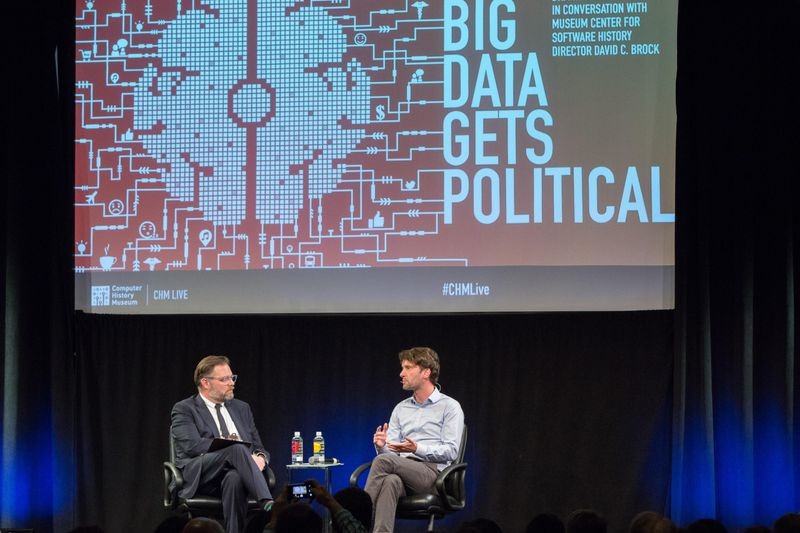
On May 19, the Computer History Museum (CHM) hosted Stanford Graduate School of Business Associate Professor Dr. Michal Kosinski for a riveting conversation about the intersection of social media information, machine learning, and politics. Kosinski, profiled by Vice earlier this year, is known for his research combining personality, Facebook likes, and demographic information. Dr. Kosinski joined Director of the Museum’s Software History Center David C. Brock on the CHM Live for “Big Data Gets Political.”

“Big Data Gets Political: Stanford University’s Michal Kosinski in Conversation with the Museum’s Software History Center Director David C. Brock,” May 19, 2017. Produced by CHM Live at the Computer History Museum.
Kosinski started the hour-long conversation by explaining his past research as a computational psychologist. His focus is on what can be learned about individuals from the large amounts of information we leave behind when using computers. Kosinski shared that he can predict future behavior and pinpoint the age, gender, sexuality, religious beliefs, and much more just from creating an algorithm to study your Facebook likes. “We all leave behind an enormous amount of digital footprints,” Kosinski said. “In my research, my main goal is to try to take this data and learn something new about human psychology or human behavior.”
..
Kosinski also discussed how assessments like these are being used by private companies already. One example of this is analytics company Cambridge Analytica, which worked with the Trump and LeaveEU campaigns to develop a dossier on voters to micro-target their messaging and advertising. Kosinski addressed the work of the company by questioning the impact of their practices, explaining that personalized political marketing is only one part of winning an election. He also stated that this technology is being used by politicians of all stripes, including Barack Obama and Hillary Clinton, so it may not offer a single politician an unfair advantage. Kosinski also discussed the benefits of providing this data to politicians, including increasing voter engagement as well as politicians’ understanding of the issues that matter to their constituents.
..
Brock challenged Kosinski with a question about whether micro-targeted political messages could create “a world where people are unable to agree on what reality is” due to politicians’ desire to persuade people with messaging, rather than encourage civic discourse or provide voters with accurate information. Kosinski addressed the question by saying that living in an “echo chamber” or “information bubble” is inevitable—and that having a single “consensus reality” can be limiting.
..
Kosinski then turned to his current research on programming neural networks to decipher psychological traits from Facebook profile pictures, much like he did with Facebook likes. “Humans are great at predicting intimate traits... of other people based on their faces,” said Kosinski, who listed detection of gender, emotion, and genetic disorders as examples. “But we are not good at predicting other intimate traits like personality, sexual orientation, or political views. This might mean there is no information about your political views on your face—but it also could mean that your brain did not evolve, or did not learn to extract this information from a human face.” He went on to explain how machine-learning algorithms can detect this information with incredibly high accuracy.
..
Kosinski also shared his vision of and concerns about a “post-privacy” world, stating that technologists focused on protecting data are giving consumers false hope about their privacy in the future. “Moving forward, there is going to be no privacy at all,” Kosinski said. “And the sooner we realize that, the sooner we can start talking about how to make sure that this post-privacy world is still a habitable and safe and nice place to live in.”
..
“Big Data Gets Political: Stanford University’s Michal Kosinski in Conversation with the Museum’s Software History Center Director David C. Brock,” May 19, 2017. Produced by CHM Live at the Computer History Museum...
The CHM Live team caught up with Dr. Kosinski backstage to chat firsts and favorites. Here’s what he had to say.
CHM Live: What was your first computer?
Kosinski: IBM XT 286; it made me feel pretty old when I spotted one less than halfway through the Computer History Museum!
CHM Live: What’s your favorite book?
Kosinski: Red Queen by Matt Ridley; it traces back the law of exponential growth to the beginning of life.
CHM Live: What’s your favorite piece of advice?
Kosinski: “If you think education is expensive, try ignorance.”
CHM Live: Which current moonshot/tech project would you most like to happen?
Kosinski: A cheap and safe nuclear fusion reactor that democratizes access to energy. This could be a major step toward global peace and ending global warming.
CHM Live: What is the first thing you do in the morning?
Kosinski: Check Facebook. (Who doesn’t?)